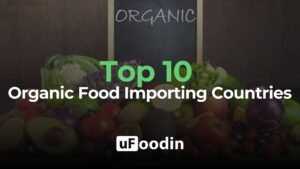
| Understanding B2B Online Sales in the Food Industry
The food industry has seen a significant shift towards online B2B sales in recent years, driven by the need for efficiency, scalability and global reach. B2B online sales refer to business-to-business transactions conducted through digital platforms, where companies buy and sell wholesale food products and ingredients.
According to Statista, the global B2B e-commerce market was valued at approximately $12.2 trillion in 2019, a figure that has been growing steadily. The adoption of digital solutions in the food sector has been particularly rapid, with companies recognizing the benefits of optimized supply chains and greater market access.
| The growing demand for B2B platforms in the Food Industry
Demand for B2B platforms in the food industry is accelerating. The global B2B food platforms market is estimated to reach nearly $249.21 billion by 2032, up from $44.49 billion in 2023, growing at a compound annual growth rate (CAGR) of 21.1% during the forecast period of 2024. -2032.
This increase is attributed to the growing need for efficient supply chain management, the growing popularity of digital markets, and the increasing complexity of global food trade. Additionally, the COVID-19 pandemic further emphasized the importance of reliable online platforms as businesses look to mitigate disruptions and maintain continuity.

| B2B Marketplaces: an additional sales channel to reach unknown buyers
B2B marketplaces serve as an additional sales channel that allows food companies to reach buyers they would otherwise never meet. These platforms provide access to a broader audience and facilitate connections with international buyers. According to a Forrester survey, 59% of B2B buyers prefer to research and buy online instead of interacting with a sales representative.
This trend underscores the importance of digital marketplaces in capturing the attention of modern shoppers. Additionally, Digital Commerce 360 reports that B2B e-commerce sales are expected to surpass $1.8 trillion by 2028, highlighting the immense potential for businesses embracing online platforms.
| Main B2B markets in the Food Industry
Several prominent B2B marketplaces specifically serve the food industry and offer customized solutions for businesses to connect, trade, and grow. Some of the leading platforms include:
- uFoodin – A specialized marketplace focusing exclusively on the food industry, providing specialized tools for businesses to showcase their products, connect with buyers, and expand their global reach. With a 100% secure payment system.
- Foods Trade – a platform that connects food producers with buyers, offering a wide range of products, from fresh produce to processed products.
- Food Maven Corp Known for its focus on reducing food waste by connecting sellers of excess food with buyers, Food Maven Corp offers a unique value proposition in the B2B food marketplace.
- Amazon – While primarily known for its B2C operations, Amazon also offers a robust B2B marketplace with a section dedicated to food and beverage companies.
- Alibaba – Alibaba, a global leader in B2B e-commerce, offers a broad platform for food businesses to connect with buyers around the world, offering extensive resources and tools for international trade.
It should be noted that the disadvantage of the last two platforms for the food industry is that neither has tools specially designed for the industry.

| Global visibility and cross-sell opportunities on platforms like uFoodin
Platforms like uFoodin not only offer a dedicated marketplace for food businesses, but also improve global visibility and cross-selling opportunities. These platforms allow companies to showcase their products to a global audience 24/7, ensuring constant exposure.
According to a McKinsey report, B2B companies that effectively use digital platforms can increase their market penetration by up to 20%. Additionally, cross-selling opportunities arise when companies leverage platform features to promote complementary products, improving overall sales.
The visibility that B2B marketplaces provide is crucial in today’s competitive landscape. With features like targeted advertising, SEO optimization, and detailed product listings, businesses can significantly improve their online presence.
For example, uFoodin allows businesses to create customized e-stores within the platform, offering a dedicated space to highlight their products and attract potential buyers. This constant visibility ensures that companies can reach new markets and engage with a diverse customer base.
Using B2B marketplaces is a strategic move for companies in the food industry looking to expand their global presence.
As the B2B food platform market will grow exponentially, leveraging these digital tools can provide significant advantages in terms of reach, efficiency, and sales growth.
Platforms like uFoodin, Foods Trade, Food Maven Corp, Amazon and Alibaba offer unique benefits that can help businesses navigate the complexities of international trade and connect with new partners around the world.























